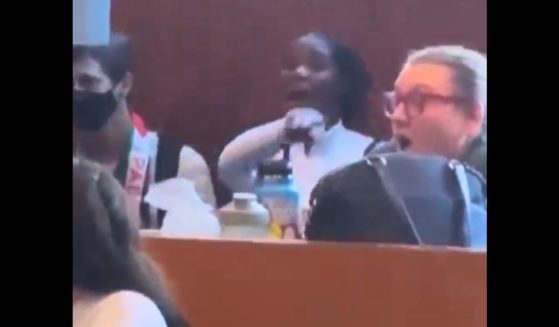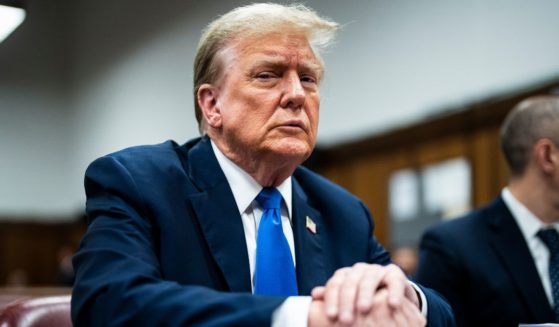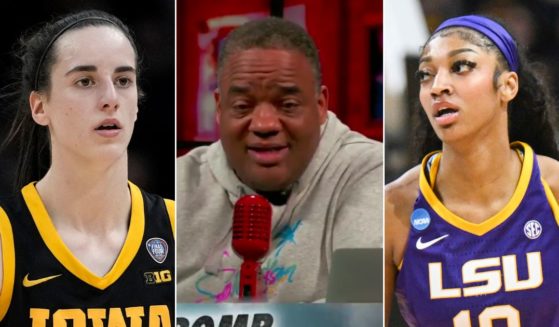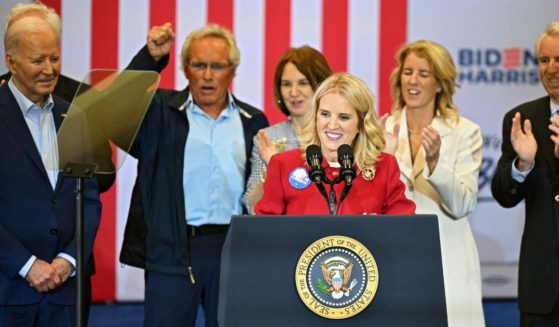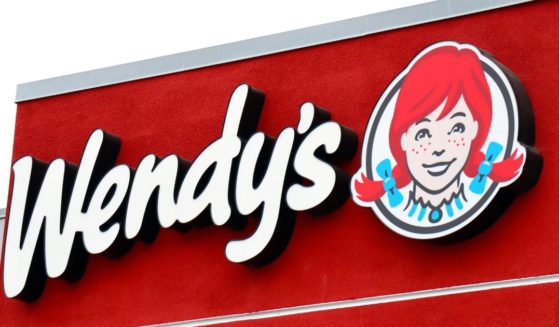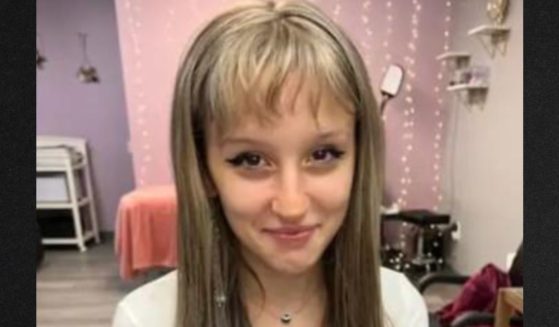Report: Instead of Firing Newly ID'd 'Anonymous' Leaker, WH Is Punishing Her with Transfer to Saudi Arabia
A set of reports published Wednesday said the White House believes it has “Anonymous,” the senior White House official behind the infamous New York Times Op-Ed titled “I Am Part of the Resistance Inside the Trump Administration” and subsequent book dealing with much the same ground.
Victoria Coates was on the National Security Council and was promoted to the No. 2 position there last fall. There’s been an abrupt shift in her fortunes, however, and she recently was demoted to a special assignment as a senior adviser in the Department of Energy, where she’s awaiting assignment to Saudi Arabia.
That, according to a report from Paul Sperry in RealClearInvestigations, is because the White House believes she’s the one behind the Op-Ed and book.
In a series of articles published Wednesday, Sperry revealed how sources inside the White House came to believe Coates was Anonymous, including textual analysis and curious coincidences between their lived experiences.
First, in case you’ve forgotten: Anonymous first published his or her Op-Ed back in September 2018, a time when the special counsel investigation seemed like The Most Important Thing That’s Ever Happened To Our Nation. In retrospect, those were blessedly simple times for our country and the world, but we were gripped for at least a few news cycles by The Times’ opinion piece in which the unnamed senior official declared that President Donald Trump was unaware “many of the senior officials in his own administration are working diligently from within to frustrate parts of his agenda and his worst inclinations.”
“I would know. I am one of them,” Anonymous declared.
That was one of plenty of mic-drop paragraphs that felt like they should have the “Law & Order” sound effect playing right after them. For weeks, we were inordinately interested in who wrote the thing and scouring other Trump administration figures’ oeuvres for uses of the word “lodestar,” a textual choice by Anonymous that seemed to stand out to everyone.
Again, in hindsight, the whole thing seems like a ridiculous parlor game; of course there were people in the Trump administration who wanted to frustrate its efforts, given that the president was fighting upstream against not only the Democrats but a wide swath of his own party, an establishment that was convinced he too would pass and they’d be laughing this off at the country club sooner rather than later.
After more than a few news cycles, we all lost interest. The book-length treatment of the subject, “A Warning,” was published roughly a year later to the interest of roughly no one who wasn’t inside the White House.
At 1600 Pennsylvania Ave., however, the book provided important textual clues to a team involved in a National Security Council probe trying to suss out who Anonymous was. Remember, Coates was promoted as recently as last autumn. To go from a promotion to near the head of the NSC to a demotion to the Department of Energy and a long flight to Riyadh is an unusual set of circumstances, and no other reports of sturm und drang from inside the presidential manse seem to point toward a reason for the move.
The establishment media have dismissed reports of Coates being Anonymous as “unsubstantiated rumors” that have been kicking around the internet. A source from the NSC, however, told RealClearInvestigations that the White House was convinced of Coates’ authorship.
“It’s her,” the source said. “That’s why she was shown the door.”
So, why Coates?
First, there’s the compelling evidence provided by computerized textual analysis of Anonymous’ two known works and what Coates has authored.
This sort of thing is pretty easy to do nowadays since advanced software can compare word choice, turns of phrase, sentence structures and other indicators to create a sort of authorial fingerprint match.
For instance, in a 2012 column, Coates described Hong Kong businessmen as “eager to curry favor with.” In a 2015 speech, she talked of “currying favor with Baghdad.” A previous book on art and democracy talked about how an Italian artist had worked “to curry favor with” a rich family. Meanwhile, in “A Warning,” the phrase “curry favor with” was used three times.
A list of other phrases that textual analysis found in common between Anonymous and Coates, as per RealClearInvestigations: “first principles,” “classical liberalism,” “chilling effect,” “wreaking havoc,” “gone sideways,” “ad nauseum,” “hell-bent” and “tin-pot.”
It’s not just phraseology, either. “Sextant” isn’t a word used much outside of nautical history books. Coates and Anonymous both used it, though.
“History doesn’t make us. We make history,” Anonymous wrote in “A Warning,” arguing for bending the arc of the Trump administration toward something more moral. “Its course is changed by the people themselves who, with their values as a sextant, navigate daily moral quandaries.”
A decade prior, Coates had used it in her book “Antiquity Recovered: The Legacy of Pompeii and Herculaneum,” albeit in a nonmetaphorical way: “As several series of sextant angles taken from prominent vantage points show, his mission also entailed mapping the surrounding territory.”
There were a litany of these scattered throughout Anonymous’ and Coates’ work.
And, more importantly, both Coates and Anonymous seemed to have a different sextant than the president did in critical matters.
Coates was known to be a national security hawk, something at odds with the president’s aversion to getting bogged down more than he felt America should be in places such as Syria and Afghanistan. Sources say she’s privately dismissive of the president, and while friends say she was supportive of his run for Trump once he became the nominee, none of her tweets in the run-up to Election Day four years ago mentions her support for the president.
She’s also an ally of Sen. Ted Cruz, one who was “livid when the Texas Republican endorsed Trump and cited national security as one of his reasons for supporting the Republican nominee,” according to a 2017 Politico article.
Beyond all that, she’s a member of the national security community, a corner of our government known to tolerate Trump with a grimace when they tolerate him at all.
She also has a history of writing anonymously, which would make her a good candidate to be, well, Anonymous.
Anonymous and Coates also share a prominent literary agent, an expedient curiosity, especially since that agent hosts what Sperry described as “an author roster of disaffected ex-Trump officials.” The agency denies any link between Coates and Anonymous, however.
“To be very clear, so there is no chance of any misunderstanding: Dr. Coates is not Anonymous,” Javelin Literary Agency, which hosts both Coates and Anonymous, said. “She did not write it, edit it, see it in advance, know anything about it, or as far [as] we know ever read it.”
Firsthand accounts say that Coates and Anonymous experienced the same events in the White House, something only a handful of other people inside the Trump administration did; according to RealClearInvestigations, the others have been ruled out by the NSC team.
And then there are a handful of personal details that match the two.
Anonymous is fond of Philadelphia, reminding readers that it’s the birthplace of American liberty in one passage. In another, she discusses a Pennsylvanian Founding Father, John Dickinson, one who’s not generally discussed by your sixth-grader over dinner when discussing his American history project but who’s well known in the lore of the Keystone State. Coates, meanwhile, owns a Victorian mansion in Philadelphia and is descended from a line of Pennsylvanians going back to 1709, including Civil War-era Pennsylvania Gov. Andrew Curtin.
Anonymous also quoted American historian Bernard Bailyn, generally unknown if you’re not in intellectual circles and scarcely known even then. Coates would have been familiar with him, however: She received a master’s in art history from Williams College, which was Bailyn’s alma mater and which includes his works as required reading.
Coates declined to comment on the RealClearInvestigations pieces and has retained a lawyer. Many of her friends say that she didn’t author either the Op-Ed or book — and to be fair, there are good points to be made in that department.
“The suggestion that Victoria is ‘Anonymous’ is preposterous,” K.T. McFarland, Trump’s first deputy national security adviser, said. McFarland said she’d reached that conclusion not only because Coates had told it to her, but she’d also told it to a much more sensitive source.
“Victoria herself has denied being ‘Anonymous’ during her routine security clearance review,” McFarland said. “Anyone familiar with the security clearance process knows that it would have been a criminal offense, punishable by jail time, for her to lie about this.”
However, Sperry said her friends had issues explaining why she would accept a demotion just four months after being promoted to No. 2 on the National Security Council. And it’s quite the demotion, being sent to a country that isn’t known to respect human rights or women’s rights and is currently undergoing a painful, protracted proxy war with Iran in Yemen. Have fun, I suppose.
Trump has told reporters he knows who Anonymous is, and the demotion seems to at least signal he believes it to be Coates.
Sources have said the administration didn’t want the distraction of a firing. A bit of social distancing — roughly 7,000 miles worth of it — is one way to do it.
If Anonymous writes a third missive titled “A Warning 2: Unnamed Brutal Middle Eastern Dictatorships Which Are Questionable Allies of the United States Aren’t Fun Places to Wait Out Pandemics,” we’ll also have a better idea.
In short, despite the fact that the media has called these reports linking Coates and Anonymous “unsubstantiated rumors,” there’s plenty of evidence that the White House believes Coates is Anonymous.
Is she? If there’s any evidence to the contrary, the fact that Coates reportedly told officials she wasn’t Anonymous during her security clearance review sticks in my craw. Despite a plethora of coincidences, I don’t quite believe anyone would be that stupid, particularly given how hard Washington was sleuthing to find out just who this person was.
On the other hand, I suppose it all depends on how seriously Anonymous meant what he or she said during the preface to “A Warning”: “If asked, I will strenuously deny I am the author of this book.”
If it’s Coates and she said that during her security clearance interview knowing full well it was false, I’d have to say she meant it pretty darn seriously.
Truth and Accuracy
We are committed to truth and accuracy in all of our journalism. Read our editorial standards.





